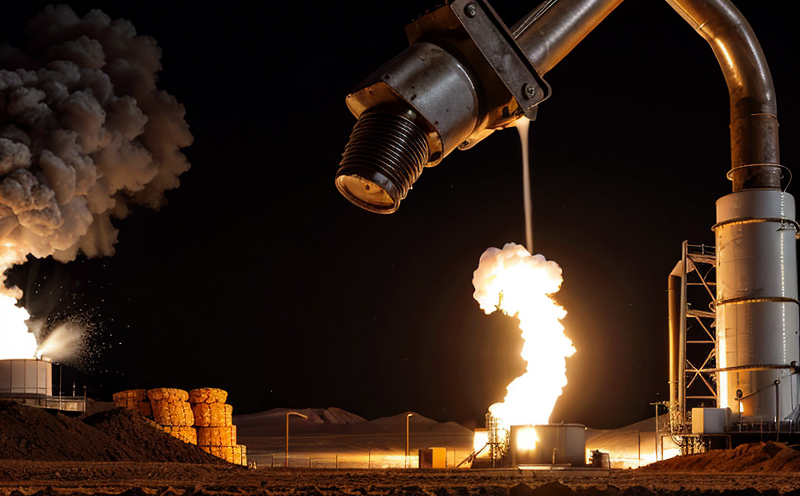ISO 8217 Marine Fuel Quality Testing for Trade Facilitation
The International Organization for Standardization (ISO) 8217 standard provides a comprehensive framework for the quality assurance of marine fuels used in maritime transportation. This service is critical for ensuring that fuel meets the stringent specifications required by international regulations and industry standards, thereby facilitating smooth trade processes.
In the context of government and trade facilitation, ISO 8217 ensures that marine fuels comply with environmental protection laws, safety requirements, and operational performance expectations. Fuel quality directly impacts vessel efficiency, emissions levels, and overall maritime operations. Proper testing not only supports compliance with international standards but also enhances transparency in the fuel supply chain.
The testing process involves a series of rigorous analyses aimed at measuring key parameters such as viscosity, sulfur content, flash point, cetane number, density, and water content. These tests are essential for ensuring that marine fuels meet the specifications outlined in ISO 8217:2017, which covers various grades of fuel oil.
For compliance officers and quality managers, adherence to these standards is not just a regulatory requirement but also a strategic imperative. By ensuring fuel quality aligns with international norms, businesses can avoid costly penalties, improve operational efficiency, and maintain their reputation in the global market.
R&D engineers benefit from this service as it allows them to innovate within the framework of established standards. They can experiment with new fuel blends or additives while knowing that they will meet regulatory requirements. This ensures that any developments are both commercially viable and compliant with international trade laws.
Procurement teams also find value in ISO 8217 testing as it helps them source high-quality marine fuels from reliable suppliers. By leveraging this service, procurement professionals can ensure that the fuel they purchase meets all necessary specifications, thus minimizing risks associated with substandard products.
The impact of ISO 8217 on trade facilitation is significant. It streamlines customs clearance processes by providing clear evidence of compliance with international standards. This reduces delays and ensures smoother operations for importers and exporters alike.
Quality and Reliability Assurance
The reliability and accuracy of ISO 8217 marine fuel quality testing are paramount in ensuring that the fuels meet all required standards. Our laboratory employs state-of-the-art instrumentation and highly skilled technicians to conduct these tests. The equipment used includes precision viscometers, sulfur analyzers, flash point testers, and densitometers.
Our technicians follow strict protocols outlined in ISO 8217:2017 to ensure that each test is conducted consistently and accurately. This includes rigorous calibration procedures and adherence to international standards for sample preparation and handling. Our laboratory has been accredited by relevant bodies to conduct these tests, ensuring the highest level of reliability.
The results from our testing are detailed reports that provide a comprehensive overview of the fuel's quality parameters. These reports are crucial for stakeholders involved in trade facilitation as they offer clear evidence of compliance with international regulations. The data provided can also be used by R&D teams to refine their products and improve operational efficiency.
Our commitment to quality is further demonstrated through our robust quality management system, which adheres to ISO 9001:2015 standards. This ensures that every step of the testing process—from sample receipt to final report generation—is meticulously documented and reviewed.
Customer Impact and Satisfaction
The impact of ISO 8217 marine fuel quality testing on customers is profound. By ensuring that the fuels meet all necessary standards, we help businesses comply with international regulations and avoid potential penalties. This not only protects their reputations but also enhances operational efficiency.
For importers and exporters, this service ensures smooth customs clearance processes by providing clear evidence of compliance with international standards. This reduces delays and ensures that shipments arrive on time, meeting the expectations of both buyers and sellers.
Our customers benefit from transparent communication throughout the testing process. We provide regular updates on sample preparation and testing progress, ensuring that they are always informed about the status of their fuel quality tests.
The reliability and accuracy of our test results also enhance customer satisfaction by providing them with confidence in the quality of the fuels they purchase. This trust is essential for maintaining long-term business relationships and fostering a positive reputation within the industry.
Use Cases and Application Examples
| Use Case | Description |
|---|---|
| Vessel Maintenance | Ensuring that the fuel used for maintenance operations meets all necessary standards to prevent operational disruptions. |
| Environmental Compliance | Maintaining compliance with environmental regulations by ensuring the fuel's sulfur content is within acceptable limits. |
| Vessel Efficiency | Optimizing vessel performance by using high-quality fuels that enhance engine efficiency and reduce emissions. |
| Customs Clearance | Avoiding delays in customs clearance processes by providing clear evidence of compliance with international standards. |
| R&D Innovation | Sourcing fuel samples for R&D teams to test new blends and additives that meet ISO 8217 specifications. |
| Supply Chain Transparency | Maintaining transparency in the supply chain by ensuring all stakeholders have access to accurate fuel quality data. |
| Purchasing Decisions | Aiding procurement teams in making informed decisions about fuel suppliers based on their ability to meet ISO 8217 standards. |
The application of ISO 8217 marine fuel quality testing is wide-ranging, covering various aspects of the maritime industry. From vessel maintenance and environmental compliance to customs clearance and R&D innovation, this service plays a crucial role in ensuring that fuels meet all necessary standards.





